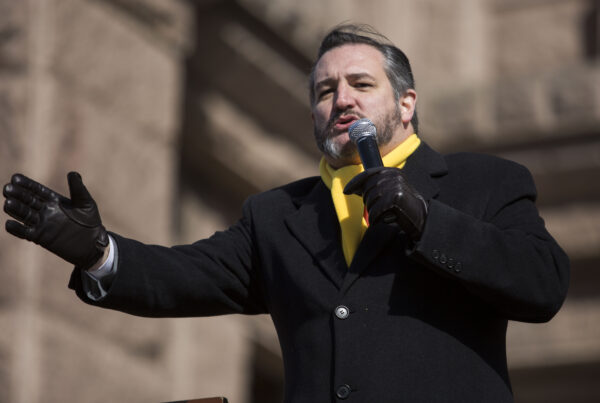Senate Republicans on Wednesday voted unanimously to block an emergency spending bill to provide over $100 billion in funds for Ukraine, Israel and other security needs. At issue is their demand for an overhaul of immigration and border security policy.
Texas Senators Ted Cruz and John Cornyn were among the most vocal members of the chamber to speak out, with Cornyn telling a reporter “I support funding for Ukraine. I support funding for Israel. But this is an opportunity for us to force the Biden administration to do what they should have been doing all along.”
Is there a chance for compromise as lawmakers prepare to leave for the holidays?
Timothy Nokken, an associate professor in the Department of Political Science at Texas Tech University, joined Texas Standard to discuss. Listen to the interview above or read the transcript below.
This transcript has been edited lightly for clarity:
Texas Standard: So how did we get here? Tying financial aid to Ukraine and Israel and our immigration and border policy, which obviously Ted Cruz and John Cornyn have a stake in.
Timothy Nokken: You know, immigration has been a policy that’s been tricky and difficult to deal with for decades. You know, the last time any meaningful overhaul of immigration took place was in the Reagan administration. So it’s a hot button issue, especially for Republican voters.
So tying this to other issues that are important to probably more Democratic-leaning constituencies is not a surprising kind of tactic. But the timing is right because of the holidays coming up.
Well, the New York Times is reporting that President Biden, when he was sending over his request for aid to war in Ukraine and aid for Israel, included this border security element, apparently to try to sweeten the pot and win over some Republicans. What happened here?
Well, this is, again, that kind of issue that has really touched Republican voters and constituencies. And Biden is a pretty adept negotiator, having served in the Senate that long.
I’m sure it was his tack to try to get some Republicans on board to do it. But the position-taking opportunity to kind of stick it to Biden was strong among the GOP and they held together and clearly it wasn’t enough for their preferences to cast a vote and help Israel and Ukraine.
Indeed, Sen. Lindsey Graham, the Republican from South Carolina, has said that it’s President Biden’s job to fix this. Where do you see the president’s role in all this? And should he, could he, be playing a bigger role?
Maybe. But, you know, the bottom line is Congress legislates and this is a legislative problem. This is a policy that’s needed attention for a long time. And, you know, Congress is not so adept at legislating. They expect the president and the executive to take over and that’s a dangerous situation. Biden acts unilaterally in a manner Republicans don’t like. That’s not good.
It really is a complicated issue that requires legislation. And does that mean the president needs to be involved? Absolutely. But Congress needs to get involved. And it’s the kind of issue that requires Democrats and Republicans to compromise and negotiate. And that’s something that Democrats and Republicans in Congress haven’t done so well at the past decade or so.
» GET MORE NEWS FROM AROUND THE STATE: Sign up for Texas Standard’s weekly newsletters
Well, professor, what seems to be the sticking point here?
Well, Democrats and Republicans have kind of different perspectives on immigration, with Republicans more strongly in favor of limiting and security issues. And Democrats are not opposed to that, but also more interested in matters of providing a pathway to citizenship for individuals already here. And that’s a very difficult two points to negotiate over.
Well, now let’s talk about what happens if Congress leaves for the winter holiday with no deal. What does that mean to our commitment for helping Ukraine and Israel?
You know, it’s tough. I don’t remember how long we have for funding for the government, but that sends a signal that, again, Congress has trouble taking care of kind of the nuts and bolts work that they’re expected to do. You know, we’ll see.
My guess is something could come about. But, you know, this is a real serious threat to those two spending initiatives.













